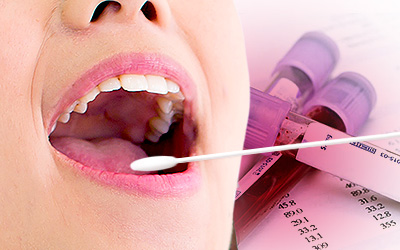Hormones are responsible for the development of our bodies and they affect us throughout our whole lives. In the human body, hormones interact with the brain and affect feelings and emotions. While both men and women have hormones, women are much more susceptible to hormone changes due to the menstrual cycle and menopause.
Hormone level tests can be crucial for a woman to understand her hormone levels. This article discusses the various ways of testing hormones and alternative treatments for symptoms of hormonal imbalance. Keep reading to find out more about hormonal imbalance tests.
Why Might I Need a Hormonal Imbalance Test?
Many women feel they need to take a hormonal imbalance test because they have a combination of the following menopause-related symptoms:

- Acne
- Bloating
- Bone loss
- Decreased fertility
- Depression
- Excess facial and body hair
- Heavy or painful periods
- Hot flashes
- Irregular periods
- Irritability
- Loss of muscle mass
- Loss of scalp hair
- Low libido
- Memory lapses
- Mood swings
- Nervousness
- Night sweats
- Poor concentration
- Sleep disorders
- Tender or fibrocystic breasts
- Urinary incontinence
- Vaginal dryness
- Weight gain
If you are suffering from one or more of these symptoms, a hormonal imbalance is likely. In this case, it is recommended that you test your hormone levels to see what further action you need to take to correct the problem. Keep reading to learn about what tests are available for hormonal imbalance.
What Hormone Imbalance Tests Are Available?

Estrogen, testosterone, and progesterone tests are the most common to test for a hormone imbalance, but often estrogen tests are recommended for women suffering from menopause symptoms. Home tests may be bought at a local pharmacy and administered at home, or you could visit your doctor's office. You, or your doctor, can test for a hormone imbalance in the following ways:
- Blood test. The most comprehensive test, a blood test can give detailed information about levels of different hormones, and help you find out whether you are deficient or dominant in one hormone.
- Urine test. There are also home urine tests to test the levels of hormones in the body.
- Saliva test. This is available as a home test, or at your local clinic or hospital. Here saliva is taken from your mouth to test for levels of hormones.
Home testing kits are often expensive and do not always give an accurate reading. For best results, it is recommended to take these tests under the guidance of a medical expert.
What Happens After a Hormone Imbalance Test?
Often, a single test is not enough to be able to diagnose a hormone imbalance. Hormone levels fluctuate along the course of a day, and across the monthly menstrual cycle. Continued testing is recommended to be able to gauge an accurate reading of hormone levels.
Once you have the results of your test, or tests, you can talk with your doctor to see what would be the best course of treatment for you and your hormonal imbalance. Click on this link for more information on hormonal imbalance treatments.


